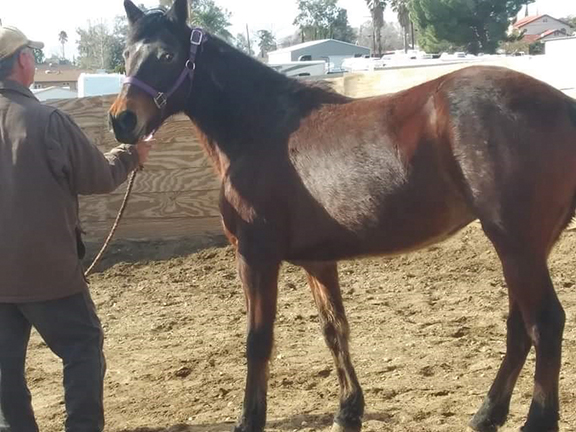The Valley Chronicle - Culling the herdng
Culling the herd
·
4 min read
Far-From-Perfect Mustang Rescue gives horses a second chance
[caption id="attachment_16917" align="aligncenter" width="576"] Far-From-Perfect Mustang Rescue
Far-From-Perfect Mustang RescueJoel Sapperfield, mustang trainer, prepares Star, one of their newest wild mustangs, for training.[/caption] ■ By Ann Hoffman / Contributed When you were a kid, did you have dreams of riding the range, maybe rounding up wild mustangs, maybe even “breaking” them to ride? Or maybe you just have a thing for horses? What if you could actually go see and touch one of these magnificent creatures that began life as a free-roaming and spirited animal? Would that be right up there on your adventure list? Well, you can. So how is it that mustangs end up in places like the Far-From-Perfect Mustang Rescue? Being a mustang isn’t always great The Bureau of Land Management routinely needs to cull the herds of wild mustangs in order to maintain the necessary space, food and water required to sustain them. There’s also a lot of controversy between those who support the mustangs and those who want them completely gone from the open ranges, and it’s been going on for decades. The bottom lines is that the Bureau sells the mustangs for next to nothing to get rid of them. Sometimes a mustang will be adopted by someone who wants a horse. And sometimes, because adoption costs are so low, unscrupulous people will buy mustangs and then turn around and sell them for slaughter, making money in the process. Can just anybody take on a mustang? Rescuing a mustang is a work of love and takes skill and understanding of their temperament. Too often people will fall in love with the idea of rescuing a wild mustang, and there is a very big difference between a wild mustang and one that has been trained. The initial cost is nothing compared to what it costs in experience, time, and money to own a horse, yet alone a mustang! For those who follow that dream, it can turn into a nightmare. And then it turns into a cry for help to get rid of the animal. And sadly, the mustang has done nothing wrong. It just ended up with the wrong human, just as the human ended up with the wrong animal. What happens next will determine the fate of the mustang. Some of them, who were adopted by someone who later decides it was a bad idea, are sold to another person with the same dream of owning a mustang. And the story repeats itself. The animal can change hands more than once and it is usually a downward spiral into neglect or even abuse. This brings us to people like Joel and Annette Sapperfield. When they learn about a mustang in need, if they have space at the rescue, they’ll take the him or her in. The Sapperfields then become responsible for care and food. Any mustang joining Joel and Annette’s barn will receive regular, proper nutrition and veterinary care, plus interaction with other mustangs. The herd is their social organization and they receive training so they are ready for that special someone who is looking for the right horse. That doesn’t come cheap. What does it cost? Right now, the Sapperfields have about 30 mustangs at the rescue and the hay alone costs them about $2,000 each month, or $24,000 per year. Vet services cost, on average, are $400 per animal per visit or an additional $24,000 per year if each mustang requires two visits in 12 months. Not to mention barn and pasture maintenance, land fees, and the many other costs for keeping a horse healthy. That’s a pretty sizeable output of money to keep it all going. Fortunately, the Far-From-Perfect Mustang Rescue is a non-profit 501(c)(3) that rescues and rehabilitates mustangs with the purpose of transitioning them to a new home. The difference is that the Sapperfields make doubly sure that the new owners know what is required to own a mustang and are able to do so. Both the Mustang Meet & Greet and the yard sale are terrific opportunities for everyone to learn more about these amazing creatures. Joel encourages anyone who is interested to come on out. If you can’t make those days, Annette says, “You’re always welcome to contact us and arrange a time to visit. We love meeting people who are interested in what we’re doing for the mustangs.” To contact Far-From-Perfect Mustang Rescue, call or text 928-274-3159, email FarFromPerfectMustangRescue@gmail.com or visit online, www.facebook.com/farfromperfectmustangrescue.
Kathleen Prokop researched and contributed to the writing of this article.
S
